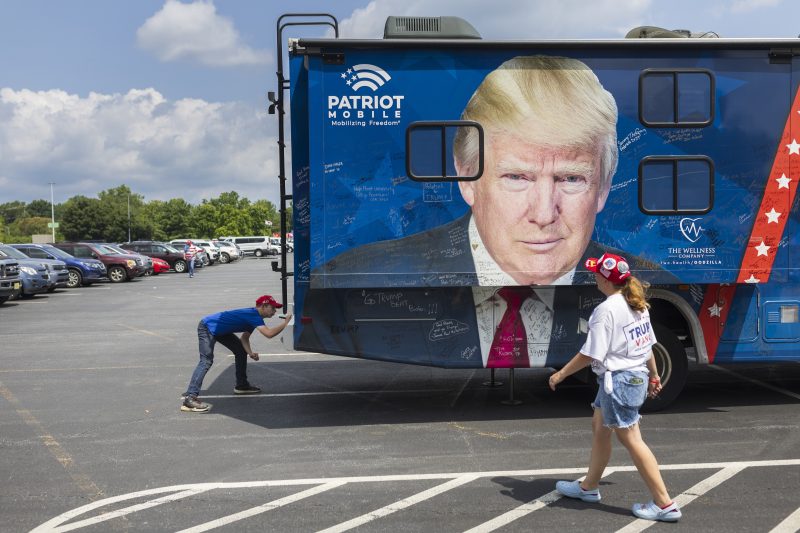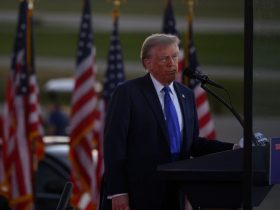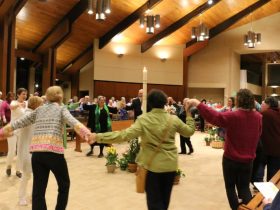CHICAGO — As invigorated Democrats celebrated Vice President Kamala Harris’s nomination this week, some of them were doing so with a wary eye on new developments in what they fear could be efforts by former president Donald Trump’s allies to create doubt about the election and muddy the result should it not go his way.
Nearly 700 miles to the south of the Chicago convention, in Atlanta, the Georgia State Election Board on Monday approved a rule that critics said would empower county election officials to withhold certification of results without justification, potentially thwarting a popular result. The board’s Trump-supporting majority also signaled plans to adopt nearly a dozen additional rules in coming weeks despite warnings from state and local officials that the lateness of the calendar all but guaranteed confusion and mistakes.
Also this week, election officials in at least three battleground states received nearly identical letters from the American Conservative Union explaining their plan to monitor ballot drop boxes and scrutinize those using them to vote. The letters prompted concerns from election officials about privacy and the possibility of voter intimidation.
In Wisconsin, meanwhile, the Texas-based group True the Vote, which peddled false claims of widespread ballot fraud after the 2020 election, is teaming with sympathetic sheriffs to monitor polling locations and drop boxes. True the Vote’s founder, Catherine Engelbrecht, said in a text that the program is “mainly focused” in Wisconsin “but we do have a scalable program.”
In the month since President Joe Biden ended his reelection bid, Democrats have cheered Harris’s rise in the polls. But with their renewed optimism has come concern among some that the newly competitive race will invite election interference. Trump has said that the only way Democrats can win this fall is by cheating, and he has not committed to accepting the results if he loses.
Democratic election officials and nonpartisan democracy advocates gathered in Chicago this week to assess the threat — and to explain what they are doing to address it. Their greatest worry, several said at an event hosted by the Brennan Center for Justice, is the possibility of civil unrest. Even if efforts to subvert election results fail, they said, an army of angry Trump supporters could resort to violence just as they did at the U.S. Capitol on Jan. 6, 2021.
“Those who are trying to destroy our election system don’t believe in the fairness of the game,” Senate Majority Leader Charles E. Schumer (D-N.Y.) told his audience. “They don’t believe in letting the people decide.”
The Trump campaign did not respond to a request for comment.
Those pushing for tighter election rules and more surveillance of voting say the steps they are advocating will increase public confidence in the November results.
“My interest is in the cleanest, most transparent accountability rules under the existing laws that I can get before voting starts,” said Ken Cuccinelli, former deputy secretary of the Department of Homeland Security under Trump and a former Virginia attorney general who now leads the Election Transparency Initiative and is supporting many of the new rules being adopted in Georgia. “I want to see good rules in place before the voting starts, and I want to see them followed. And that didn’t necessarily happen everywhere in 2020.”
The efforts to impose stricter rules and more oversight have ramped up significantly this month, since Harris ascended to the top of the Democratic ticket and battleground polls tightened. Trump’s efforts to overturn the results in 2020 centered on the six most competitive battleground states that year, where Biden’s razor-thin victories fueled conspiracy theories about forged ballots, intentional miscounts and other false claims of fraud.
Watching drop boxes
The American Conservative Union’s chairman, Matt Schlapp, jumped into the fray with a letter to officials in at least three states this week — Arizona, Georgia and Wisconsin — laying out plans to monitor ballot drop boxes.
“The goal is to establish standards for drop box observation that our organization, as well as any other interested parties on the right or left, can rely upon and reassure the public in Georgia that drop boxes are not being fraudulently used,” Schlapp wrote in a letter to Georgia Secretary of State Brad Raffensperger and Attorney General Chris Carr, obtained by The Washington Post. “Failure to do so risks that the results of the November elections will be questioned by those who did not support the winning candidate.”
Schlapp, whose organization puts on the annual Conservative Political Action Conference, explained that his purpose is to encourage, not discourage, voting. In a written response to questions, Schlapp said his organization has identified unmonitored boxes “as one area that undermines people’s faith in fair elections.”
Election officials dismissed that premise and said they are concerned about the group’s stated plan to use “open-source information” to identify those using drop boxes who are not eligible to vote. No evidence has ever surfaced that drop boxes enabled widespread fraud in the 2020 election.
“The whole thing is an absurd sham to cover up direct efforts to intimidate voters by a bunch of CPAC-recruited vigilantes,” said Arizona Secretary of State Adrian Fontes (D). The effort’s purpose, he added, is “to intimidate voters — and we absolutely will not be cooperating with them.”
In Maricopa County, home to most of the state’s voters, most drop boxes are located inside of public buildings or polling locations that are staffed and monitored. The county has two outdoor drop boxes, which are located on government property and are monitored by security cameras.
In Georgia, state officials said the Schlapp letter reflected a lack of understanding of Georgia election law, which already requires counties to install drop boxes inside election offices, where they are available for use only during business hours and must be monitored by video.
“We already do all of this,” said Deputy Secretary of State Jordan Fuchs.
Focus on election certification
Democrats and voting rights advocates said they are paying particularly close attention to efforts to empower local election officials not to certify results, which could impede the process of declaring a winner and create an opportunity for violence or disorder by stoking unsubstantiated worries that fraud tainted the election result.
Megan Bellamy, vice president of the Voting Rights Lab, said her organization has tracked possible avenues to block certification in at least five states: Arizona, Georgia, Michigan, Nevada and North Carolina. And she sees a fundamental misunderstanding of the law among those leading the efforts.
“Certifying the election result is a requirement. It is not a choice,” she said.
Even after certification, she added, anyone with questions about the results may file an election contest in court.
That argument was not persuasive in Georgia, where the State Election Board’s pro-Trump majority voted Monday to approve a new rule allowing county election boards to make “reasonable inquiries” if they have questions about the outcome. The rule does not specify what a reasonable inquiry is, and it places no limits on the time frame of such a probe or what documents a board can demand.
Janelle King, one of those board members, said there is no intent to hold up certification past the statutory deadline, which this year is one week after the election.
“It allows them to inquire about any documents needed for them to feel comfortable certifying,” she said.
Critics don’t trust that explanation, particularly after Trump called out King and her two conservative colleagues by name at an Atlanta rally earlier this month, describing them as “pit bulls fighting for honesty, transparency and victory.”
The new certification rule in Georgia may be only the beginning. The majority has proposed 11 additional rules that will come up for approval close to the state’s Oct. 14 early-voting start date. Among the proposals is one requiring a hand-count of ballots in precincts to make sure the number of votes recorded equals the number of ballots. It’s a task that voting machines already do.
The bipartisan election board in Muscogee County, Ga., has asked the state board not to approve the rules until after the current election, reflecting concern among some local officials that there is no time left to change procedures without introducing significant complication.
“If you look at the comments from the election directors to the board, they’re all saying, ‘Don’t do this right now,’” said Ryan Germany, former counsel to the secretary of state. “‘We are in the middle of getting ready. Don’t change the rules on us. That’s a recipe for mistakes.’”
Wingett Sanchez reported from Phoenix. Colby Itkowitz, Patrick Marley and Jesús Rodríguez contributed to this report.










